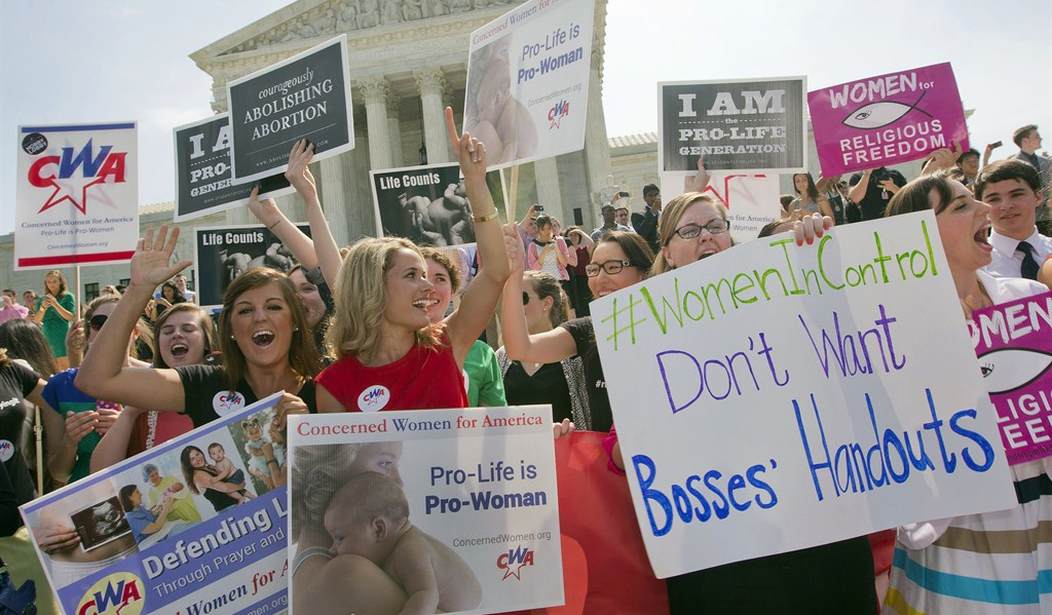Democrats know that single women could be the key in the upcoming midterm elections. It’s why they’re unleashing Rosie, the name of their voter mobilization program.
We know the trend: single women turn out in droves during presidential years, but stay home during the midterms. The same goes for minority voters. But, with the Democratic Senate majority at stake, liberals are concentrating their efforts trying to energize this key demographic (via NYT):
Half of all adult women over the age of 18 are unmarried — 56 million, up from 45 million in 2000 — and now account for one in four people of voting age. (Adult Hispanics eligible to vote, a group that gets more attention, number 25 million this year.) Single women have become Democrats’ most reliable supporters, behind African-Americans: In 2012, two-thirds of single women who voted supported President Obama. Among married women, a slim majority supported Mitt Romney.
“You have a group that’s growing in size, and becoming more politically concentrated in terms of the Democrats,” said Tom W. Smith, director of the General Social Survey at the National Opinion Research Center of the University of Chicago.
Single women, Democrats say, will determine whether they keep Senate seats in states including Alaska, Colorado, Iowa, Michigan and North Carolina — and with them, their Senate majority — and seize governorships in Florida, Pennsylvania and Wisconsin, among other states.
The party is using advanced data-gathering techniques to identify unmarried women, especially those who have voted in presidential elections but skipped midterms. By mail, online, phone and personal contact, Democrats and their allies are spreading the word about Republicans’ opposition in Washington — and state capitals like Raleigh — to pay equity, minimum wage and college-affordability legislation; abortion and contraception rights; Planned Parenthood; and education spending.
Recommended
Well, that’s certainly a buffet of issues that any American liberal would salivate over. Yet, liberals have a long way to go (via Voter Participation Center):
Unmarried women’s turnout in 2012 was 57.8%. Their turnout level did not reach the same high (59.8%) that it saw in 2008, but was up from just 38.3% in 2010. Unmarried women were just 24.0% of the electorate in 2012, despite making up 25.6% of the VEP. This share is an increase from 2008 when they made up just 23.2% of the electorate. Looking ahead to the 2014 elecRon, among unmarried women, turnout is predicted to be just 32.9%, making them just 22.0% of the predicted 2014 electorate.
So, based on these figures, liberals need to mobilize the one-third of single women voters, who voted in 2012, who are projected to stay home in 2014.
That’s quite the homework assignment especially when the Obama administration has given little – save for this Hobby Lobby decision – for liberals to get excited about this cycle. Additionally, there are other more localized issues, such as the Keystone Pipeline and new coal regulations, that could further hamper these get-out-the-vote efforts.
Emma Akpan, a graduate student at Duke Divinity School who was quoted in the Times piece hyperlinked above, admitted that if she wasn't helping Democrats register single women in North Carolina; she "probably wouldn’t pay attention either.” Additionally, just because register someone to vote, doesn't mean you can count on them by Election Day. There's a reason these people were never registered in the first place.
Regardless of the threat single women pose to Republican plans to takeover the Senate, Politico noted yesterday that the Senate field still favors them:
Six months ago, the GOP path to the majority was narrower: Republicans essentially had to sweep seven races in states Barack Obama lost in 2012 but where Democrats currently hold seats. Unlikely, in other words.
Now Republicans have more options. They’ve landed top recruits to take on first-term senators in New Hampshire and Colorado, nominated credible female candidates in open-seat contests in Michigan and Iowa, protected all of their incumbents from tea party challenges and thwarted more conservative candidates that could have hurt the GOP’s chances in states like North Carolina and Georgia.
With the general election field all but set, Republicans are looking to turn the midterms into a national referendum on Obama. Democrats want the focus to be squarely on the candidates, and they’re spending the typically quiet summer months trying to define Republican hopefuls as unlikeable and extreme.
Nevertheless, as previously mentioned, it seems Montana, South Dakota, and West Virginia are safe GOP pickups, but the GOP still needs to find three more seats to flip.
Even with the Hobby Lobby ruling's potential in firing up women, Obamacare remains incredibly unpopular, with 40% of Americans – on average –approving of the new law. This will continue to hamstring Democrats – and it doesn’t help that 85% of the inconsistencies relating to the application process can’t be fixed:
Federal officials can’t resolve 85 percent of 2.9 million “inconsistencies” on applications for ObamaCare even after nine months of trying, according to new data provided by the administration.
Most of the problems involve certifying citizenship and income, key components of the national health plan.
But some of the problems are downright nutty.
One unidentified state-run marketplace cited situations in which infants and young children were “erroneously identified as incarcerated, according to federal data,” the inspector general for the Health and Human Services Department revealed Tuesday.
Just 425,000 problematic applications have been resolved out of 2.9 million that states and the federal exchange reported, the Centers for Medicare and Medicaid Services told The Post.
























Join the conversation as a VIP Member